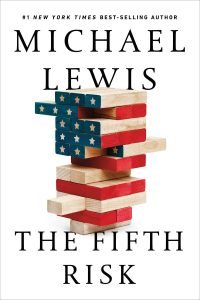There’s a scene in Michael Lewis’ book, The Fifth Risk, about President Donald Trump’s takeover of the federal government that I can’t forget. It takes place in the offices of the Department of Energy on November 9, 2016, the day after Trump unexpectedly beat Hillary Clinton to win the presidential election. Most people don’t know what the Department of Energy does—Lewis didn’t before starting work on this book—but one of its central missions is safeguarding the U.S. nuclear arsenal and combating nuclear proliferation, so it’s pretty important. If you’re running for president, you, or at least someone who works for you, should know what the Department of Energy (DOE) does.
So, on the morning of November 9, department staffers awaited the arrival of Trump emissaries, as they did when President Obama was elected, and President Bush before him, and President Clinton before him, and so on. They had already cleared 30 desks and 30 parking spaces. “They didn’t know exactly how many people they’d host that day,” Lewis writes, “but whoever won the election would surely be sending a small army into the Department of Energy, and to every other federal agency.” This is what people who work in the federal government do when a new president is elected; they pivot, and they work for a new president.

Then a funny thing happened. Nobody came. Not on the first day, not the second. Even stranger, the same was true across the federal government. The people who actually did the work of the government agencies—Energy, Labor, Health and Human Services, Housing and Urban Development, Commerce and so on—waited for their new leadership, but it simply…didn’t show up. And in the few instances where Trump people did make themselves known, they didn’t know what they were doing. A handful went to the State Department, for example, but couldn’t get the briefings they wanted because they lacked security clearances they didn’t know they needed.
Over the next weeks and months, as the Trump people slowly inched their way into the offices of government agencies, they typically arrived either ignorant of the work of that agency or hostile to it, frequently both. Trump’s choice to run Energy, for example, was former Texas governor Rick Perry, who, when he was running for president in 2012, had vowed to abolish the department. After Trump nominated him to run it, Perry rather sheepishly admitted that during the time he was talking about eliminating the agency, he hadn’t actually known what it did. But, he added, he now looked forward to learning more about it.
The Fifth Risk was published in 2018, and it spent 14 weeks on the bestseller list, which for any other author would be a triumph but for Lewis might be considered a modest success. If you haven’t read it, you probably have the time to do so now, and you should: No other work so accurately and insightfully predicts what would happen to a country led by Donald Trump should a crisis occur—the leadership chaos, the government dysfunction and, yes, the loss of human life. The Fifth Risk isn’t Lewis’ most commercially successful book, but it may be his most important. Reading it now—or re-reading it, as I recently did—one realizes that we are now living through basically, everything Lewis worried about in this book. 

In a 2019 podcast with MSNBC’s Chris Hayes, Lewis explained how he came to write The Fifth Risk. “I had just had surgery on my hip when Trump was elected, and I was stuck in bed and I was being given these opioids and I was in this horrible state of mind,” Lewis said. “And I was thrashing around thinking, aside from my hip, why do I feel the way that I do? And it was this sense that Trump was a risk-loving person and an ignoramus. He was being given this enterprise [running the government]. And I started thinking about all the different ways he might kill me…And then, I thought, what if we had a way to measure all the deaths that Donald Trump was responsible for as president? We could create something like a death clock and put it in Times Square, and it would just scroll, and every time someone died because they didn’t have health insurance that they would have had without him…”
Lewis abandoned that idea when he concluded that there was no methodologically viable way to create such a clock. But his premise—that “at its very basic level, the government’s job is to keep us safe”—nagged at him. And so he began talking to people at government agencies such as the departments of Energy, Agriculture and Commerce. “And when you wander around [the government], you start to realize how many things there are to keep us safe from,” as he told Hayes. “Terrorist attacks or pandemics or natural disasters…”
Lewis found a number of things that surprised him. One was that, contrary to popular perception, the people who work for our government are not freeloading dullards shuffling papers in a dank basement somewhere. The dozens of civil servants Lewis interviewed could all have made more money in the private sector. They were smart, passionate, committed. Many of them were immigrants, or the children of immigrants, who came from countries that had dysfunctional governments. They knew what a difference good government could make in bettering and saving people’s lives—and how bad government could cost lives. The idea that the federal government harbored a “deep state” of career bureaucrats who planned to undermine Trump? Well, there was just no evidence of that.
What Lewis also discovered was just how important the work was that government employees did—not just at the DOE, but throughout the government. Lewis interviewed one now-retired U.S. Department of Agriculture (USDA) employee named Kevin Concannon who had, for eight years, until Trump, run the country’s school-lunch program—another program that ensured that pregnant women, new mothers and younger children receive proper nutrition—and about a dozen smaller programs also intended to alleviate hunger. You’ve never heard of Kevin Concannon; no one has. But the programs he ran accounted for some 70 percent of USDA’s budget. Over the course of his USDA career, Concannon had overseen the spending of nearly a trillion dollars—about half of what the U.S. government just allotted to stimulate the economy. Millions of Americans had fuller stomachs, in part, because of Kevin Concannon’s administrative abilities.
You’d think that Concannon would be an important person for a new president’s team to meet with—to spend quite a lot of time with—even if they wanted their own person in that role. But no one associated with the Trump transition ever spoke with him or anyone who worked for him. Silence. And so, Concannon retired. Lewis spoke with him at his home in Maine, where he had baked some banana bread to prepare for the journalist’s arrival.
In the instances when the Trump appointees did show up, Lewis found, they had very specific and not very helpful interests, like deleting all mentions of climate change from the Environmental Protection Agency (EPA) website or taking violent crime statistics off the Justice Department website (which made it hard to find out if crime rates were rising). Often, they had self-serving financial agendas; they wanted to profit off their government jobs. Barry Myers, the man Trump wanted to head the National Oceanic and Atmospheric Administration (NOAA) which produces all the nation’s weather data, was the CEO of Accuweather, which uses that taxpayer-funded data to sell you weather information. Myers wanted to prevent the public from accessing NOAA’s data, so that you’d have to buy it…from Accuweather. If you wanted to find out that, say, a tornado was bearing down on your town, it would cost you.
Unlike Rick Perry, some Trump appointees came in with both hostility to and knowledge of the agencies they wanted to dismantle; Mick Mulvaney, for example, believed that the Consumer Financial Protection Bureau (CFPB), which protects consumers from financial fraud, shouldn’t actually exist. Which explained why in January 2018, in one of his early acts as the CFPB head, Mulvaney made his first budget request for the agency…zero dollars.
Trump himself wasn’t like Mulvaney, Lewis concluded—he didn’t actually know anything about what the government did, he just knew that he didn’t like it. “Trump wasn’t some diabolically clever Ayn Randian who was going to dismantle the government piece by piece in a systematic and intelligent way,” Lewis explained to Chris Hayes. “He just couldn’t be bothered and thought, ‘It’s all dumb.’” Well, Lewis added, “who’s going to show up for work in that administration?”
All of which brings us to coronavirus and the current state of White House confusion. The president’s spoken responses to the pandemic have reflected his longstanding impulses to minimize bad news that he cannot control, act dismissively toward events that might hurt him politically and simultaneously elevate himself as a savior figure. (We’ll restart the country on Easter!) We’ve learned to live with these things, but this situation is different that most of what the president speaks to; it’s about life and death. When the president encourages people to use a particular drug to fight the virus, bad things can happen.
Perhaps even more importantly, Trump’s inability to run the government, his ignorance of its capabilities and his emasculation or dismissal of thousands of its best employees have crippled the administration’s response and fueled the spread of coronavirus. (The New York Times has some excellent reporting on how Trump’s anti-government hostility has left gaping holes in organizations such as the Department of Homeland Security, the Food and Drug Administration and the Treasury Department—all of which have crucial roles to play in the fight against the virus.) As a result, we’ve seen the shortages in testing for the virus, the lack of production of personal protective equipment, the refusal to mandate production of ventilators, the now almost laughable suggestion that CVS, Target and Walmart would lead the testing fight. According to a recent article in Politico, the National Security Council (NSC) had, in 2016, written a report warning against pandemics that recommended every move health experts are now calling for; the Trump administration has ignored it. In 2018, NSC head John Bolton disband the Council’s pandemic team, the group that was established to anticipate and address, you know, pandemics.
Reading The Fifth Risk now isn’t simply an exercise in learning what went wrong and thinking, “How did we not see this coming?” (Anyway, some people did.) It’s also a book that speaks to the future—about examining our attitudes toward government as the country heads into a presidential election. Decades ago, Ronald Reagan inspired and exacerbated anti-government sentiment among huge chunks of the electorate. Remember his famous quip that “the nine most terrifying words in the English language are ‘I’m from the government and I’m here to help’”? Donald Trump is making us finally accept that, whether we like it or not, we need our government’s help.







